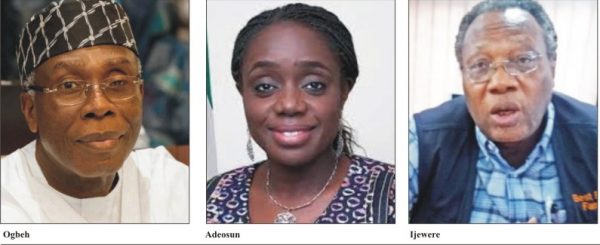Diversification: Applying Science To Farming In Nigeria
 By Oyeniyi Iwakun
By Oyeniyi Iwakun
As Nigeria seems to have learnt a bitter lesson from the recent economic calamity experienced as a result of its over dependence on oil over the years, efforts by government and individuals are now channeled towards alternative means of revenue generation for the economic survival of the country.
Despite economic experts’ prediction of a possible economic meltdown between 2014 and 2018, Nigeria still finds itself among nations strongly hit by the recession with consequent effects on the economic, secular and religious transactions within the nation and this pervasive malaise has bred ruthlessly into every facets of national life, rendering the entire political, economic and administrative systems dangerously precarious, shaky and wobbly. However, with government’s acclamation of the nation’s exit from this recession, Nigerians are still arguing that they cannot feel the effect such exit in their daily business activities and welfare.
The position of every stakeholders has been in favour of the expedient need of government to diversify the nation’s economy having realized that the over dependence on oil ever since the days of its discovery and boom have accounted majorly for Nigeria’s adventure into recession which could have been averted ab initio if the right policies and measures were put in place at the right time.
It is incontrovertible that proceeds from crude oil and other petroleum products have been the major source of income for the federal government of Nigeria but for the fall in crude oil price in the wake of 2015, Nigeria had been grappling with turbulent economic times which has culminated into distrust and disconnect between the government and the governed.
It is also noteworthy that Nigeria is currently an import driven economy that relies on other countries for virtually all her needs including food items and other equipments within the country.
Speaking to MMS Plus on activities that led to recession, a renowned world Bank consultant, Dr. Okey Ani opined that the Nigerian government wouldn’t have been able to do anything better at that moment to avert the economic downturn because they didn’t start from the fundamental. According to him, things were built without foundation which make it look as if it is a culture of Nigerians. Ascribing the challenges to endemic corruption, Dr. Okey argued that corruption itself is even not part of the Nigerian culture. For him, it was an imported culture which was allowed to grow and that is where the problems lie.
He said “That is why today, in education, health and overall societal values, people are now focused in materialism. They don’t want to do anything tangible to improve themselves and build a productive economy.”
In quest for ameliorations to these problems, agriculture has been advanced by scholars and the government taking into cognizance the heavy human and natural endowment of the Nigerian state as one of the most lucrative and sustainable areas for economic development of the country.
In an elaborate interaction during a recent visit by members of Lagos Mainland (LMDS) and District Society of Institute of Chattered Accountants of Nigeria (ICAN), the Chief Executive Officer (CEO), Best Foods Ltd, Mr. Emmanuel Ijewere, identified agriculture as a major available alternative sector for economic diversification in Nigeria citing his experience in the sector over the years after he retired from the banking sector and professional practice as Chartered Accountant.
Ijewere who is also a member of National Economic Forum (NEF) advised the visiting Chartered Accountants and general public to maximize the opportunity by investing their resources in agriculture in order to improve their finances and as well contribute to the economic development of the nation noting that food and cash crops production have become ever important in Africa if anyone and even the country itself must be liberated economically.
The former ICAN Boss who took his guests on a tour to his farm at Epe, and Lekki where they were shown the farm environment, introduced them to the greenhouse and open-field farming techniques and also shared his experience in modern poultry farming and cattle butchering.
Ijewere educated his audience that insufficiency in food production still remains a big problem confronting most African States, Nigeria inclusive even as he noted that Lagos state alone with about 24.8 million population is bigger than over 30 other African countries but Lagos still finds it difficult to feed more than 1% of its population, hence the need for more involvement in farming activities in Nigeria.
While unveiling the potentials in farming, Ijewere advised strongly that enough research and knowledge must be sought by prospective farmers, emphasizing the imperativeness of off-takers in any farming venture to ensure profits and investment security.
Observing that in Nigeria, most persons working in corporate organizations might not want to leave their primary jobs for farming, Ijewere explained that agriculture itself doesn’t mean one has to be a farmer but can tap into the value chain and it starts from the seedlings, training, land preparation, transportation, plowing the land, and others even as he explained that Agriculture being 90% science has experienced drastic improvements and upgrade and all information needed to succeed in the business are available on the Internet.
“The greenhouses are expensive but long term investments that when you invest your money, you can determine whatever you are producing there and you can also say what kind of product you want and the materials that would be used will be there for the minimum of 15 years.
“You do not need to go into farming blindly. There are bodies that have done a lot of work in the past years and are ready to give you what you need to put on ground.
“Cassava is part of it. You would be told the amount you need for one hectare of Cassava and what you will get back as profit but as it is, you can make a minimum of 100% profit in 12 months of Cassava if properly managed.
“Agriculture is no longer 100% energy, it is only 5% to 10% energy. That’s how America is able to feed 800 million people round the world with only 200,000 farmers but Nigeria has 47 million farmers yet unable to feed 170 or 200 million people. When science now took over, we started with having the land, supported with the best technology in the open field, the market already organized and we have also decided to have our own secondary market.” he said
The former ICAN boss posited that aside the high food demands particularly in Lagos state, agricultural produce are export driven even as he warned that it wouldn’t be advisable to set up the greenhouse farms without being physically present to monitor it and get trained in handling it.
The Integrated country project manager for greenhouses in Dizengoff, Mr. Oscar Walombe, while explaining the opportunities in the greenhouse farming system said it is called greenhouse technology because of the vegetables commonly grown inside it.
He noted that the greenhouse technology is embraced because of the advantages associated with it which includes increased yield over the open field farming techniques.
Mr. Walombe posited that greenhouse farming is the only business that the investor can recoup his business in the first year if things are done in the right manner even as he observed that one of the things that scare people away from agriculture is because of much labour and little to show for it.
The Agriculture expert argued that vegetables grown on the open fields amount to exposing them to pests therefore requiring more efforts in getting pesticides to control the insects.
“I am very sure that many of us are aware that we aren’t yet sufficient with food production and any nation that is not self sufficient in food production for its consumption without external aid cannot be said to be developed.
“Once you provide what is missing in the market, you are already in business. The crops you have seen in this farm are of different stages because we want the investor to create a difference in his or her own market. One thing the market wants to get from you is the sustainability of the project.
“We are advancing a proper way of farming, hence the greenhouse technology where there is plant support system with each components in it having its peculiar advantage. We are adopting integrated pest management system because I know several farms that have been wiped off to grasshopper, cricket and other pests attacks.
“If you plant tomatoes in the open field for instance, the return would be 7 tons per hectare. The green house here is about 8 meters and 24 meters large area, that’s about 192 square meters. That is just a fraction of what a hectare is because a hectare is about 10,00 meters. But with the tomatoes in the greenhouse here, I am very sure of minimum of 5 tons every season.
“When you are cultivating in greenhouses all the produce are sold in terms of weight not in numbers. For instance, 4 tomato from greenhouses make 1 kilogram but about 10 tomatoes is needed from the open field to make 1 kilogram. In greenhouses you decide when you want to be in production and when you don’t.” he said.
He noted that it is imperative to have a market for the crops an individual intends to plant in the greenhouse before embarking on the project because the market automatically determines what and when to produce.
The farm manager, Mr. Bambo Adelaja took the delegates on the open field farming techniques, explained that the major challenge with the open field farming is water for production noting that the field is exposed to the sun which made it easy for evaporation and the expanse of land needed for open field production is very massive compared to the greenhouses.
The open field according to him, is meant to complement what the greenhouses cannot produce because while the greenhouses would target the prime products, open field targets the conventional market on how more productions can be made available even as he admitted that the yields may not be as high as those in the greenhouses.
“We have prepared our fields for all sorts of planting and transplanting and we target the prime period when the crops will be relationship scarce so that we can make them available.” he said.
The marketing manager, Best Foods Fresh Farms Mrs. Odiere Ogechukwu educated the audience that crops to be grown are determined before off-taking as she encouraged them to invest in agriculture because the demand for foods in Nigerian cities cannot be met currently.
“We all know that Lagos state’s population is large and the market is also large and the population is still growing. 90% of the foods we consume come from the North. Lagos state is the largest consumers of these foods and we don’t have enough. The market is available, People should invest.
“We are looking forward to expanding what we have here and our own share of the market and one advantage in having the farms around Lagos is proximity. You have interface with the clients because they want something fresh and give them a longer shopping life. As you harvest you take them to the market same day or next and people will get them fresh. Then the customer is happy and when the customer is happy, you are happy too.
The hotels, supermarkets and conventional markets are our targets.” she said.
Mrs. Nwaneri Olubukola, CEO Naija Pride Agribusiness Global limited explained that her company which is trying to bridge the gap between food shortage in Lagos and supplies from the North said there are efforts towards partnering with farmers up in the North.
According to her, some of the farmers are already under the borrowers anchor scheme due to the partnership they have with Naija Pride.
Mrs. Nwaneri also encouraged the professionals and other potential investors to key into the supply chain which she described to be very long because it starts from when the seeds are being nursed till they are harvested.
“You can plug yourself into any of the stages and you will still remain in Agriculture.
“We have memorandum of understanding (MoU) with farmers and we serve as major off-takers to take away the pain from the farmers.” she said.







